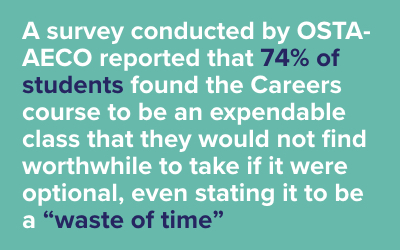Preparing students for the future
New careers curriculum has greater focus on transferable skills
The province has announced that new Careers curriculum will be introduced in the fall of 2019.
Stating that the new curriculum furthers a provincial mission to ensure “our young people are better prepared to transition from the journey of learning seamlessly into the workforce,” Minister of Education, Stephen Lecce, said the new curriculum will include a focus on transferable skills, STEM and financial literacy.
The changes to the careers curriculum fit with a global call to equip students with the skills and competencies that will help them to succeed in a rapidly changing world. Along with announcing these changes, the Ministry committed to working to integrate transferable skills across all curriculum expectations.
“We need a new way of thinking about job requirements. Developing human skills — things like critical thinking, judgment, and decision making — will empower young people to pivot between careers and across sectors even as job descriptions change.”
RBC Humans Wanted: How Canadian youth can thrive in the age of disruption
Students have described previous curriculum as “a waste of time”
 For a number of years, students have raised concerns about the Careers course, and this year, a survey of more than 10,000 Ontario students, conducted by the Ontario Student Trustees’ Association, found that 74% would not take if it were optional. The survey also found that 70% of students 70% believed that they were receiving insufficient financial literacy education.
For a number of years, students have raised concerns about the Careers course, and this year, a survey of more than 10,000 Ontario students, conducted by the Ontario Student Trustees’ Association, found that 74% would not take if it were optional. The survey also found that 70% of students 70% believed that they were receiving insufficient financial literacy education.
Three strands focus on skills, preparation and finances
In outlining the vision for the new curriculum, the document states that, “To prepare students for the future, it is necessary to empower them to take an active role in finding their path in the world of work and the community.”
The curriculum is divided into three main strands, with expectations in each:
- Developing the Skills, Strategies, and Habits Needed to Succeed. Students will:
- Understand the skills, strategies, and habits that can contribute to success in education, work and life.
- Learn skills that support resilience, including “adapting to change, persevering in the face of adversity, learning from mistakes, and thinking positively about setbacks.”
- Learn how to use “a range of strategies to help manage stress and achieve and maintain a healthy school/life/work balance.”
- Learn to apply a range of decision-making strategies to help “set personal, social, educational, and career/life goals, and develop the capacity to evaluate and revise those goals based on what they learn about themselves during this course.”
- Exploring and Preparing for the World of Work. Students will:
- Understand “technological, economic, and social trends that have influenced the world of work, both locally and globally…and analyse the possible impact of those trends on their own choices now and in the future.”
- Develop an understanding of transferable skills; how they are developed and “how they contribute to a person’s readiness for future educational, life, and work opportunities and to their career development” and “identify the transferable skills that they may need to develop further.”
- Develop a personal profile including an exploration of “their own interests, values, skills (including transferable skills), strengths, and areas that require further development”
- Understand how digital media use and social media presence can influence education and career/life opportunities.
- Learn about the “role of networking, including traditional and online social networking, in exploring and securing education and career/life opportunities.”
- Planning and Financial Management to Help Meet Postsecondary Goals. Students will:
- Develop a plan for their first post-secondary year, whether in apprenticeship training, college, community living, university, or the workplace, and prepare a variety of materials for communicating their strengths and aspirations to prospective mentors, program administrators, employers, and/or investors
- Learn to “use effective and appropriate forms, media, and styles to communicate their skills, experience, and achievements to prospective mentors, program administrators, employers, community organizations, scholarship funders, or investors.”
- Understand financial management and the “fundamentals of financial responsibility” including the variety of ways to save money.
- Learn how to “compare different forms of borrowing and identify some of the risks and benefits associated with each.”
- Learn how to make a budget, and create one for their first post-secondary year.
Learn more about the new curriculum:
